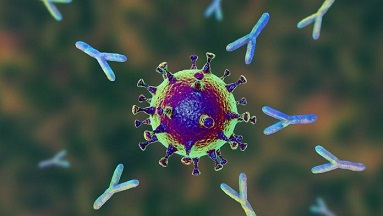BREAKING! Antibodies That Can Neutralize SARS-CoV-2 Discovered In A 20-Year-Old Human Antibody Repository Library! Implications For Virus Origin?
Source: Thailand Medical News Nov 03, 2021 4 years, 4 months, 1 day, 13 hours, 19 minutes ago
Researchers from Shanghai Tech University-China, the Scripps Research Institute, La Jolla-USA, University of Oxford-UK and the Oxford Glycobiology Institute-UK have made a startling discovery of isolating human antibodies that were stored in a repository database dating back more than 20 years ago! The discovery could maybe also have implications about the origins of the SARS-CoV-2 coronavirus!

Combinatorial antibody libraries not only effectively reduce antibody discovery to a numbers game, but enable documentation of the history of antibody responses in an individual. The COVID-19 pandemic caused by the pathogen SARS-CoV-2 has prompted a wider application of this technology to meet the public health challenge of pandemic threats in the modern era.
Shockingly herein, a combinatorial human antibody library constructed 20 years before the coronavirus disease 2019 (COVID-19) pandemic was used to discover three highly potent antibodies that selectively bind SARS-CoV-2 spike protein and neutralize authentic SARS-CoV-2 virus. Compared to neutralizing antibodies from COVID-19 patients with generally low somatic hypermutation (SHM), these three antibodies contain over 13–22 SHMs, many of which are involved in specific interactions in their crystal structures with SARS-CoV-2 spike receptor binding domain. The identification of these somatically mutated antibodies in a pre-pandemic library raises intriguing questions about the origin and evolution of these antibodies with respect to their reactivity with SARS-CoV-2.
The study findings were published in the peer reviewed journal: Advanced Science.
https://onlinelibrary.wiley.com/doi/10.1002/advs.202102181
The ongoing health crisis caused by the COVID-19 pandemic has affected over 248 million individuals to date and caused more than 5.02 million deaths globally so far.
Monoclonal antibodies (mAbs) that target the severe acute respiratory syndrome coronavirus 2 (SARS-CoV-2) spike glycoprotein have been found to have good neutralization efficacy in the treatment of Ebola virus, SARS, middle east respiratory syndrome (MERS), infections in the past as well as in treating COVID-19 as indicated by recent studies.
To date, the viral spike protein has been the key target for the development of therapeutic mAbs. Most neutralizing antibodies (NAbs) bind directly to the spike protein's receptor-binding domain (RBD), although some NAbs bind to the N-terminal domain.
Various sources from which NAbs are derived include SARS patients, memory B cells from SARS-CoV-2 convalescent patients, immunized humanized mice encoding the human immunoglobulin repertoire, single domain human antibodies from existing libraries, alpaca nanobodies, and phage display antibody libraries.
The multinational study team reported the selection and characterization of 3 potent SARS-CoV-2 antibodies - S-E6, S-B8, and S-D4 - from a pre-COVID-19 human combinatorial antibody library that was established 20 years ago. The antibodies bind to the RBD of the spike protein, thus competing with the human angiotensin-converting enzyme 2 (hACE2) receptor. Compared to antibodies derived from COVID-19 patients with low somatic hypermutation (SHM), these 3 antibodies had more than 13–22 SHMs. Many of these mutations were involved in specific interactions with SARS-CoV-2 spike RBD.
&
lt;br />
Corresponding author Dr Richard A. Lerner from the department of Chemistry, The Scripps Research Institute told
Thailand Medical News, "The combinatorial antibody library technology allows the same evolutionary process to be performed in vitro as it restores the ‘fossil record’ of an individual's antibody response in a test tube."
The study findings show that a highly diverse combinatorial antibody library can mimic the natural immunity selection process and allow the detection of unexpected, high-affinity antibodies targeting the spike protein. It also permits the selection of binding molecules with chemistries not accessible during in vivo selection.
Importantly combinatorial antibody libraries can immensely simplify the antibody discovery process and also enable the documentation of the antibody response history of an individual. In addition, the COVID-19 pandemic has prompted scientists across the globe to use this technology more widely to mitigate the unprecedented public health crisis related to the pandemic.
In this study, a combinatorial human antibody library constructed in 1999 was used to discover three potent antibodies that can selectively bind to the spike protein of SARS-CoV-2 and neutralize the virus. When combined with antibodies taken from convalescent patients or convalescent plasma, these antibodies derived from combinatorial libraries proved to be an effective therapeutic option and a possible antidote to immune escape by newly emerging variants of SARS-CoV-2.
Dr Lerner added, "Mixtures of antibodies targeting distinct epitopes can be used to overcome such immune escape. Since a complete antibody repertoire of an individual is the starting reservoir of all possibilities, one can also learn much more about the origins and evolution of an immune response against viral challenge when it is studied."
Importantly the presence of highly potent NAbs in a pre-pandemic library of "healthy" donors could indicate prior exposure of donors to similar coronaviruses in the past or to an antigenic surface that closely resembles the SARS-CoV-2 RBD.
The study team said that it still remains to be seen if these antibodies result from background immunity. Since there is a random coupling of VH and VL sequences in the original combinatorial antibody library, the isolated antibodies do not fully represent the natural selection process of the human B cell repertoire.
Significantly, identifying these antibodies with high SHM in a pre-COVID library raises interesting questions about their origin and evolution and their reactivity to SARS-CoV-2.
Furthermore, a better understanding of immune response regarding interactions between NAbs and their SARS-CoV-2 binding epitopes can provide a blueprint for the design of next-generation vaccines.
The study team added, "We cannot rule out potential implications of such findings from libraries made decades ago concerning the origin of the viruses currently circulating."
For the latest updates on SARS-CoV-2 Research, keep on logging to
Thailand Medical News.
